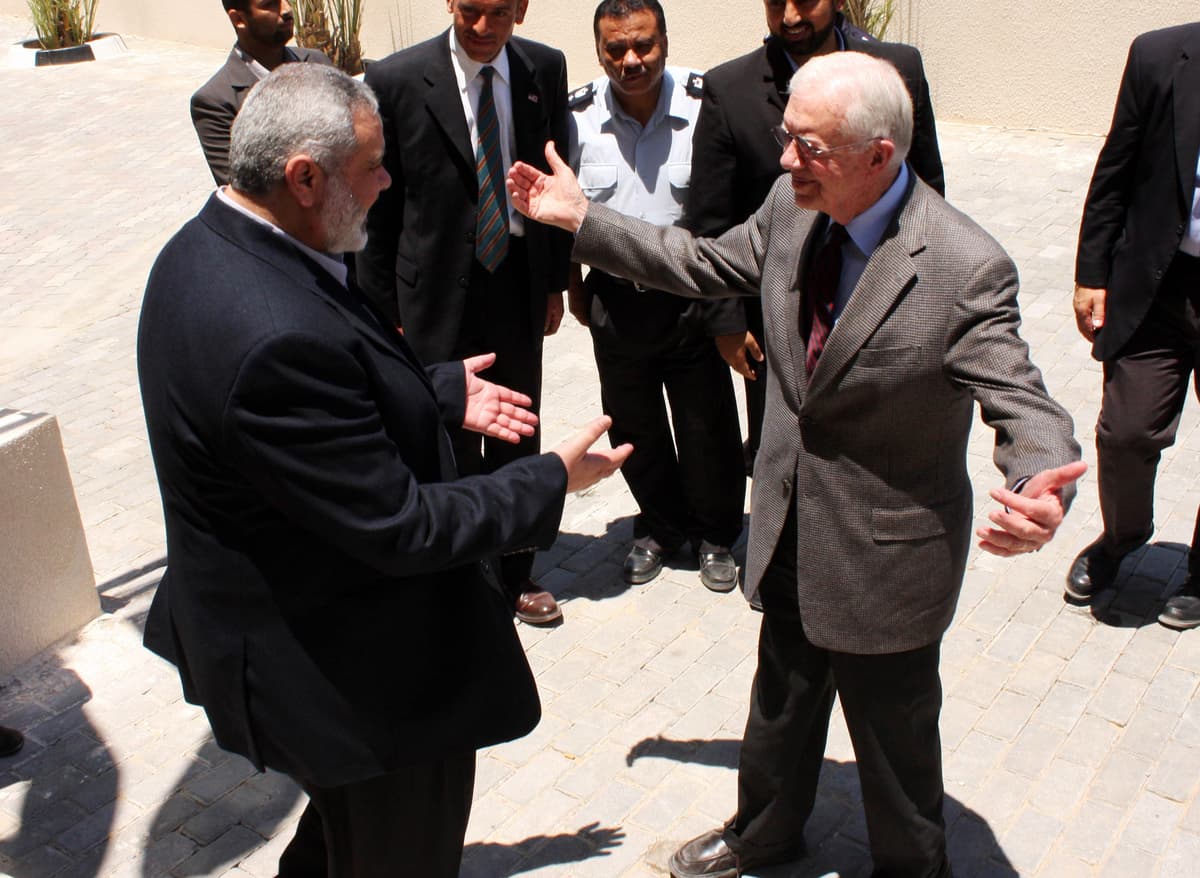Carter ‘Embellished His Role’ in Camp David Accords, Author Tells the Sun
That’s the claim being made by a veteran political science professor in Israel who authored a book on the peace negotiations.

Although President Carter is being eulogized as the peacemaker between Israel and Egypt, one historian on the subject is arguing that the former president is deserving of far less credit for his part in what are known as the Camp David Accords.
A veteran political science professor in Israel, Gerald Steinberg, who authored a book on the Camp David peace process, claims, in an interview with the Sun, that Carter “very strongly embellished his role” in the negotiations. That’s one of the findings in Mr. Steinberg’s book, “Menachem Begin & the Israel-Egypt Peace Process.”
The book, brought out in 2019, details the peace talks between the former prime minister of Israel, Menachem Begin, and the erstwhile president of Egypt, Anwar El-Sadat. It references, for the first time, Israeli documentation of the proceedings. These notes — which include “thousands and thousands of pages of documents” — offer a “far more complete documentation” of the peace talks than the dossier which has been declassified by the American government, he says.
Through his research, Mr. Steinberg tells the Sun, he discovered that Carter “really hyped his own role” in the talks and that the credit for achieving peace between the enemy countries “should certainly be shared between Sadat and Begin.” Mr. Steinberg adds that the narrative that Carter pushed the proceedings through against the reluctance of Begin “is completely unsupported by the historical record” and that many of Carter’s summaries of events “are very different than the way they are described in the Israeli notes.”
Mr. Steinberg concludes that some of Carter’s efforts at Camp David were “counterproductive” and actually delayed the agreements. This can be said of his emphasis on the Palestinian issue, which had already been settled between the two leaders. “Carter did not display the type of moral leadership that many of the eulogies and obituaries tend to credit him with,” Mr. Steinberg tells the Sun.
Few, if any, of Carter’s critics suggest that a deal could have been reached without American sponsorship. So Carter deserves his place in the Sun. Mr. Steinberg, who also founded the NGO watchdog group called NGO Monitor, aired his view of Carter’s “very problematic relationship” with Israel and the Jewish community in a now-viral post he shared on X Monday morning. Mr. Steinberg, in his thread of posts, suggests that the late president approached “Jewish sovereignty and power” with a combination of “ignorance” and “arrogance” and “a thinly hidden Christian theological hostility.”
Additionally, in his post, Mr. Steinberg sheds light on how fraught Carter’s relationship with Israel was in the years after his presidency. That was furthered by his 2006 book, “Palestine: Peace Not Apartheid.” The claims in Carter’s book, Mr. Steinberg contends, “helped legitimize and propel this propaganda campaign and 21st century blood libel.”
“Carter embraced and propagated the Palestinian Arab victimhood narrative, joining in blaming Israel rather than 100 years of rejectionism, wars, terror, incitement, etc. for the conflict and suffering,” Mr. Steinberg laments. “Perhaps this was out of ignorance, or perhaps malice.”
Mr. Steinberg tells the Sun that he feels compelled to share his take on Carter because of the miscategorization, in the wake of his death, as a peacemaker in the Middle East. “I thought it was important to say that Carter should not be seen as a role model.”
In the days following Carter’s death, other historians and pro-Israel activists have shared similar critiques of the former president’s relationship with Israel and the Jewish community. One prominent activist, Lizzy Savetsky, shares on X an image of Carter embracing a former Hamas leader, Ismail Haniyeh, during a meeting in 2009. She calls Carter’s treatment of Israel “unforgiveable.”
During the same trip to Gaza in 2009, Carter spoke at a graduation ceremony for students who had completed schooling from the United Nations Relief and Works Agency, a UN organization which has been accused of maintaining deep-rooted ties to several terrorist groups. In his speech, Carter expressed his sympathy for the citizens of Gaza who he claimed “are treated more like animals than human beings.”
Even though President Biden faces criticism for his policies on Israel from the Jewish community and pro-Israel advocates, Mr. Steinberg says, “Biden still goes out of his way, even now, to say, ‘I am a Zionist. I support Israel.’” Carter, on the other hand, “never expressed himself in those kind of warm terms.” As such, Carter ultimately left a negative impression on Israelis. According to Mr. Steinberg, Begin and other Israeli officials would refuse to meet with Carter during his trips to the Middle East.

